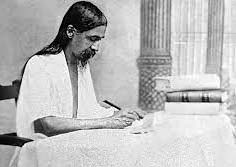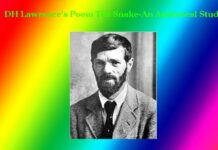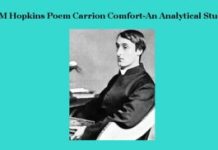Sri Aurobindo Thought the Paraclete | A Critical Analysis
Sri Aurobindo Thought the Paraclete
Sri Aurobindo Thought the Paraclete | A Critical Analysis
‘Thought the Paraclete’ is a romantic-mystic piece of poetry by Sri Aurobindo. The title word ‘Paraclete’ means the Holy Spirit (God) as an advocate or counselor. In this piece of poetry, the poet shows his mystic experience in nature and thus he believes that his soul has made a communication with the soul of God. The poem is lyrical in tone. Its language is simple but bears some compound words and phrases.
The poet says that as the vision of the ‘bright archangel’ (here comet) flies in the sky for a moment with light so the thought of the poet was lost within itself and looked at God’s universe. Then he saw a vision. The vision was like a hippogriff (a mythical griffin-like creature with the body of a horse). Its face was bright. It seemed like a hermit. Its glow was so bright that all the brightest stars and objects of the universe withered in front of it. It drew near the poet singing a sweet song. It came suddenly from heaven, seeing that vision, the poet felt immense joy within himself and had felt more that it illumined his heart. But after only a moment, it fled away singing, a song to the poet and disappeared. The poet says:
”Thought the great-winged wanderer Paraclete
Disappeared slow – singing a flame word tune
Self was left, love, limitless, nude, immune.”
From the above analysis of the poem, it is seen that the poet was spiritually lofty-minded. He believed that the spirit of God is present everywhere. A meditative man may experience it. But this belief has no realistic basis. It is the temper of the mind.
The language of the poem ‘Thought the Paraclete’ seems to be easy, but in reality difficult to paraphrase. It has all the characteristics of compactness in structure and meaning. There are some compound words and phrases that add difficulty to the understanding of the poem. 0 0 0
Sri Aurobindo Thought the Paraclete
Read More: The Poetry of Sri Aurobindo-Chief Features
N. B. This article entitled ‘Sri Aurobindo Thought the Paraclete | A Critical Analysis’ originally belongs to the book ‘Indian English Poetry Criticism‘ by Menonim Menonimus. Sri Aurobindo Thought the Paraclete
Books of Literary Criticism by M. Menonimus:
- World Short Story Criticism
- World Poetry Criticism
- World Drama Criticism
- World Novel Criticism
- World Essay Criticism
- Indian English Poetry Criticism
- Indian English Poets and Poetry Chief Features
- Emily Dickinson’s Poetry-A Thematic Study
- Walt Whitman’s Poetry-A Thematic Study
- Critical Essays on English Poetry
- Tawfiq al-Hakim’s Novel: Return of the Spirit-An Analytical Study
- Tawfiq al-Hakim’s Novel: ‘Yawmiyyat Naib Fil Arayaf’-An Analytical Study
- Analytical Studies of Some Arabic Short Stories
- A Brief History of Arabic Literature: Pre-Islamic Period …
Books of Composition by M. Menonimus:
- Advertisement Writing
- Amplification Writing
- Note Making
- Paragraph Writing
- Notice Writing
- Passage Comprehension
- The Art of Poster Writing
- The Art of Letter Writing
- Report Writing
- Story Writing
- Substance Writing
- School Essays Part-I
- School Essays Part-II
- School English Grammar Part-I
- School English Grammar Part-II..
Related Searches:
- The Individual and Society-Guide Book
- The Individual and Society-DU Notes
- The Golden Treasury of Indo-Anglian Poetry
- Indian Poetry-A Survey by Satish Kumar
- The Harp of India-Henry Derozio
- ‘To the Moon’-Henry Derozio
- Night of Slaughter Duryodhan’s Death
- Ramesh Chunder Dutt’s Poem ‘Sita Lost’
- The Wizard Knight’
- ‘King Porus A Legend of Old’
- Rose of God by Sri Aurobindo
- Short Summary of Rose of God by Aurobindo
- ‘Trance of Waiting’
- Short Summary of ‘Thought- the Paraclete’…











